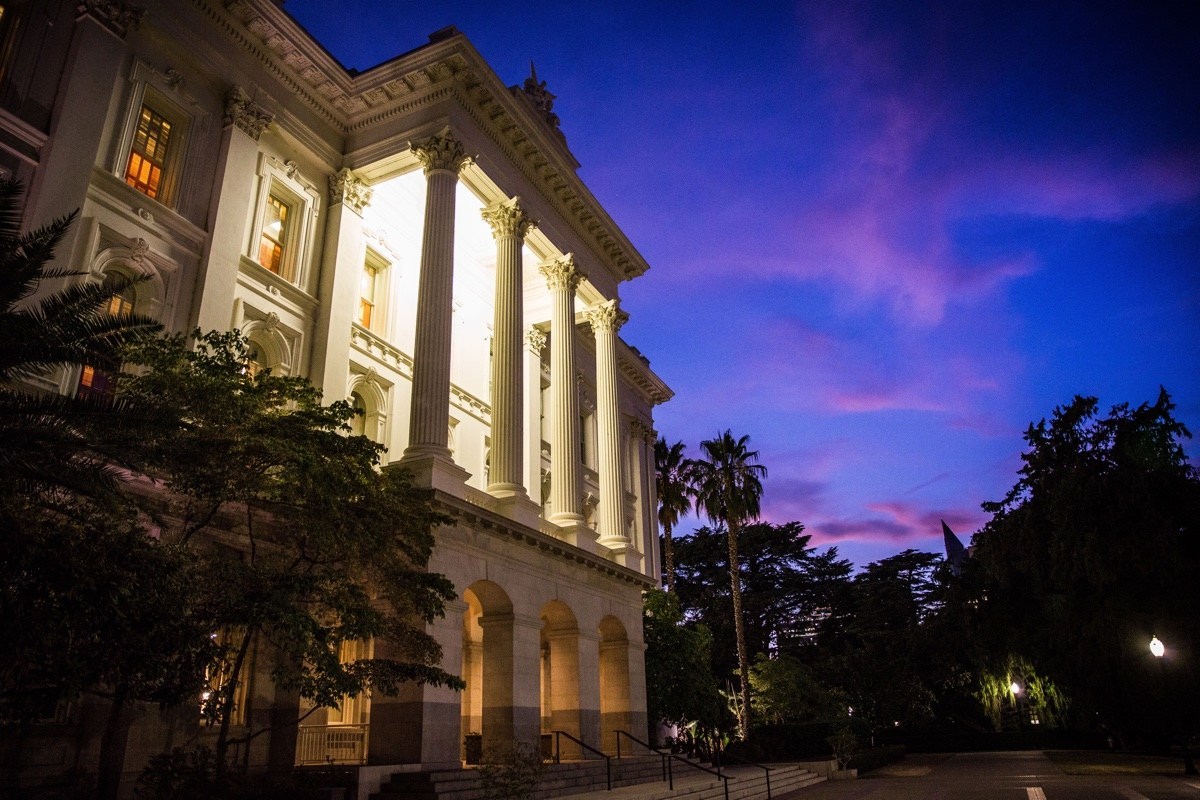The second year of the coronavirus pandemic in California was shaped by two political undercurrents at the state Capitol: a budget awash with cash, thanks to a booming stock market and federal aid, and a looming recall election asking voters to throw Gov. Gavin Newsom out of office.
The massive budget surplus allowed Newsom and legislative Democrats to go big on a progressive agenda they believe will help the state recover from COVID hardships. They passed a $262.6 billion budget that includes preschool for all 4-year-olds, health insurance for low-income undocumented immigrants age 50 and older, and $600 stimulus payments for most Californians — landing in bank accounts just weeks before the Sept. 14 recall election.
Newsom found himself with so many dollars to spend that he gave away $115 million to encourage Californians to get the COVID-19 vaccine with a series of game-show style lotteries.
But gobs of money and Democrats’ supermajority didn’t make everything possible. Tensions between moderate and liberal Democrats stymied many proposals. The recall threat also may have doomed some legislation that might have reflected unfavorably upon California and its governor. Bills that stalled included proposals to create single-payer health care, ban corporate donations to political candidates, legalize psychedelic drugs, sanction clinics where addicts can use illegal drugs under medical supervision, and allow people to turn their bodies into garden compost after death. Progressive legislation to allow more offenders to have their records expunged and overhaul the bail system also stalled amid concerns over California’s rising murder rate and an especially brutal killing in Sacramento.
With epic wildfires burning in a state stricken by drought, lawmakers approved $1 billion for wildfire prevention but rejected a bill that called for reducing greenhouse gas emissions beyond current mandates, which officials have said California is already not on pace to meet. Democratic Senate leader Toni Atkins told reporters after the last night of the session wrapped up that such ambitious legislation may take more time to negotiate, and she expects that to continue next year.
The final night was unusually subdued compared with the chaos of the last two years. At the end of 2020, Republican senators were forced to vote remotely because of a COVID infection while Assemblymembers were required to vote in person, prompting one to make a late-night floor speech cradling her newborn baby. Not to mention the previous year, when the Senate was evacuated and a hazmat crew called in after an anti-vaccine protester tossed a menstrual cup of blood from the overhead gallery, splattering senators.
Amid the relative calm of 2021, lawmakers managed to send the governor hundreds of bills, which he has until Oct. 10 to sign or veto. Even if voters oust him on Sept. 14, the transition period of as long as 38 days means the fate of these bills is in Newsom’s hands. Here are 21 of the most interesting or consequential. We’ll keep updating his decisions as he makes them.
— Laurel Rosenhall
Changing single family zoning

WHAT THE BILLS WOULD DO
SB 9 would allow most homeowners across the state to build two houses or a duplex where now only one house is allowed. The bill, carried by a team of Democrats led by Senate leader Toni Atkins of San Diego, would also permit eligible homeowners to split their lot and add two more units on the second parcel — as long as it’s at least 1,200 square feet and outside fire hazard zones or historic districts. Owners would have to stay in their homes for at least three years after splitting their lots.
SB 10 by San Francisco Democratic Sen. Scott Wiener would let a local government rezone single-family parcels to allow as many as 10 units near public transit hubs and within urban areas.
Both bills would allow homeowners and developers to skip lengthy review processes, but projects would still ultimately be subject to final approval by the city.
WHO SUPPORTS THEM?
The growing Yes in My Backyard movement has been trying to increase density for years, with mostly failed attempts. Realtors, landlords, builders, developers and Facebook all back the bills, which were central to the affordable housing package.
WHO’S OPPOSED?
Dozens of California cities, mayors and council members, including the Los Angeles City Council, say the zoning changes take away local flexibility, decision-making and community input. Neighborhood groups such as Livable California also argue the bill doesn’t create affordable housing, and could spur gentrification. Opponents are already organizing a ballot measure in November 2022 to reassert local control over zoning.
WHY IT MATTERS
About two-thirds of California is zoned for single-family homes, and California is short between 1.8 million and 3.5 million homes, which Newsom campaigned on building by 2025. While a zoning change won’t magically create the missing units, allowing building where it’s now illegal would add to the overall housing stock over time. Together, these bills are the most significant in years approved by the Legislature to address California’s housing crisis; a sweeping bill to reduce local control over zoning and create more affordable housing failed in 2018, 2019 and 2020.
GOVERNOR’S CALL: ?
Ending secret settlements
By Grace Gedye

WHAT THE BILL WOULD DO
SB 331 would ban employers from using secret settlements to prevent workers from speaking out about all kinds of illegal harassment or discrimination, with some limited exceptions. Carried by Democratic Sen. Connie Leyva of Chino, it builds on a law passed in 2018, which limited the use of non-disclosure agreements to settle cases of sexual discrimination, harassment or assault.
WHO SUPPORTS IT
A bevy of legal groups, labor groups, and women’s advocacy groups support the bill. It is co-sponsored by California Employment Lawyers Association, Equal Rights Advocates and Ifeoma Ozoma, a former public policy official at Pinterest who broke her non-disclosure agreement to speak out about discrimination she says she faced at the company. They say secret settlements perpetuate workplace discrimmination and harassment because they prevent survivors from speaking out.
WHO’S OPPOSED
Initially, objectors included a group of businesses and trade associations, helmed by the California Chamber of Commerce, arguing that the bill would effectively end the use of severance agreements. Businesses that choose to use severance agreements often do so in part to safeguard against potential reputational harm. In response to several amendments, such as one that allowed employers to keep the size of severance payments confidential, the Chamber and other groups withdrew their formal opposition.
WHY IT MATTERS
Non-disclosure agreements are used widely among the world’s most powerful tech companies, many of which are based in California. Other industries use them too. By allowing workers to come forward with their allegations, this bill could prevent repeat offenders from harassing others. It would also allow workers to discuss their experiences with family and friends even if they decide not to go public — something many of these agreements prohibit. The flip side: Businesses concerned about protecting themselves against reputational harm would have one less tool in their toolkit if this bill becomes law.
GOVERNOR’S CALL: ?
Booting bad cops
By Robert Lewis

WHAT THE BILL WOULD DO
SB 2 would give the state’s Commission on Peace Officer Standards and Training the power to decertify an officer for wrongdoing — effectively kicking them out of the profession. It would also create an advisory board made up of mostly civilians without policing experience to look into serious misconduct allegations and make recommendations to the commission on whether to revoke an officer’s certification. A decertification bill failed last year. This year’s version, by Democratic Sens. Steven Bradford of Gardena and Toni Atkins of San Diego, was amended to partially placate law enforcement, including requiring a higher two-thirds threshold vote of commissioners to decertify officers.
WHO SUPPORTS IT
The American Civil Liberties Union, California Innocence Coalition and a long list of criminal justice reform organizations are supporting it. An advocacy organization formed by Black professional athletes and artists, including Lebron James, sent an open letter urging passage. Supporters say the bill would increase accountability, protect the public from bad officers and help restore trust in the system.
WHO’S OPPOSED
Law enforcement groups — notably the Peace Officers Research Association of California and the California Police Chiefs Association. Both have said they support decertification in theory but worry the advisory board is designed to be biased against police. They also say the definition of “serious misconduct” that could cost accused officers their careers is too vague and subjective.
WHY IT MATTERS
Blue California is one of only four states in the country without the power to decertify an officer. As a result, stories have been reported through the years of officers involved in questionable killings being allowed to stay on the street, only to kill again. And there have been cases of officers fired from one department, then quietly moving to another department. This bill would change that. It’s also a test of the degree to which lawmakers are willing to do more to rein in police over the opposition of powerful law enforcement associations.
Ethnic Studies to graduate
By Joe Hong
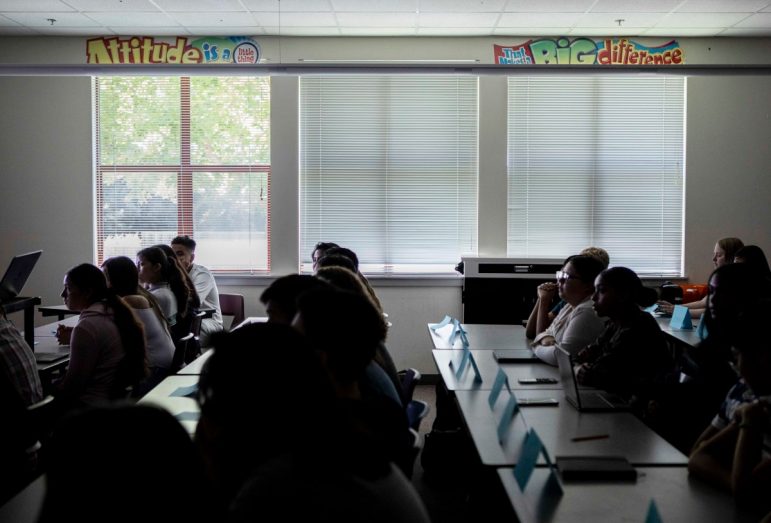
WHAT THE BILL WOULD DO
This is the third attempt by Democratic Assemblymember Jose Medina of Riverside to require ethnic studies for all California public school students. AB 101 would make ethnic studies a graduation requirement. If signed, the law would go into effect by the 2024-25 school year, beginning with the class of 2030. School districts could either develop their own lessons or use the model curriculum developed by the state board of education.
WHO SUPPORTS IT
Pro-equity advocacy groups, teachers unions and a handful of larger school districts that already have ethnic studies courses. Many education researchers say students, especially those of color, perform better in school if they see themselves in what they’re being taught. Experts also say that requiring teachers to engage with historic oppression and varied student backgrounds could prompt them to rethink the way they teach other subjects like literature, science and math.
WHO’S OPPOSED
Some parents across the state continue to fight against ethnic studies, erroneously conflating the course with critical race theory, while other parents have called the curriculum divisive, fearing it could ratchet up racial tensions. Reluctant rural districts have said they lack the resources to put the curriculum in place.
WHY IT MATTERS
Gov Gavin Newsom vetoed this idea last year, saying the state needed to modify a much-criticized model curriculum developed by the California Department of Education. Jewish groups, for instance, condemned previous versions for an alleged bias towards Palestine. The state board assuaged some critics by approving a significantly revised curriculum in March. If the curriculum attains its goal, it would create a more inclusive California school system.
GOVERNOR’S CALL: ?
Massive expansion to college financial aid

WHAT THE BILL WOULD DO
This is a once-in-a-generation overhaul of the already generous Cal Grant, the state’s chief financial aid program. AB 1456 would add another roughly 120,000 community college students eligible for the grant’s $1,650 in annual support. It will also expand eligibility for about 40,000 students at four-year colleges to have their tuition partially covered at private schools and fully waived at the Cal State University and University of California. The expanded aid will be the result of loosening eligibility requirements, including getting rid of time-out-of-high-school and age restrictions plus either dropping or lowering GPA requirements. Added state cost: estimated between $85 million to $175 million a year, plus start-up cost of $58 million.
WHO SUPPORTS IT
Carried by Democratic Assemblymembers Jose Medina of Riverside and Kevin McCarty of Sacramento plus Sen. Connie Leyva of Chino. The Chancellor’s Office of the California Community College is a fan, largely because Cal Grant eligibility rules have excluded hundreds of thousands of low-income community college students.
WHO’S OPPOSED
The governor’s Finance Department, citing higher costs than bill backers estimate and fears that state universities will raise tuition. Cal State has issues with it, too.
WHY IT MATTERS
This is huge, both on its own merits and how it would mesh with other major new and forthcoming financial aid overhauls. Various expansions of the Cal Grant would coincide with the Legislature’s plans to create a debt-free grant for low- and middle-class UC and Cal State students, though notably not for community college students. For years lawmakers have tried to take big swings at enlarging the state’s college affordability programs, but cost stopped them. Now that California’s coffers are expected to overflow, lawmakers are seizing the chance to bring college affordability to hundreds of thousands of more students. Whether that commitment remains during lean times is a question.
GOVERNOR’S CALL: ?
Taking on Amazon’s warehouse quotes
By Jackie Botts
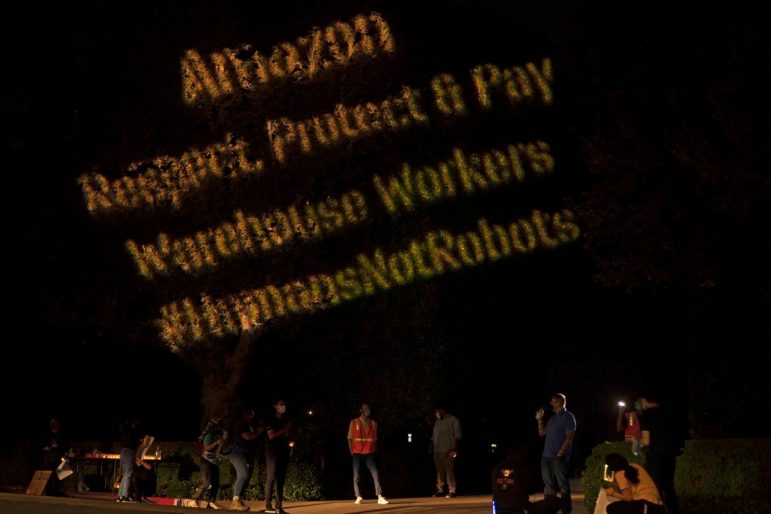
WHAT THE BILL WOULD DO
AB 701 would make California the first state to require warehouses to disclose to workers any quotas or work speed standards, as well as the potential consequences for failing to meet them. It would also ban companies from penalizing warehouse workers for complying with health and safety laws that slow the pace of their work — including taking breaks, using the bathroom or following COVID-19 precautions.
WHO SUPPORTS IT
Introduced by Assemblymember Lorena Gonzalez, a San Diego Democrat famous for introducing controversial labor legislation, the bill is backed by a long list of unions, worker centers and legal nonprofits that represent workers.
WHO’S OPPOSED
Local and statewide chambers of commerce oppose the bill, along with numerous business associations representing retailers, grocers, farmers, manufacturers and truckers. They argue that existing law already protects workers, and that the bill could open employers to costly lawsuits and limit their options to deal with underperforming workers. The California Chamber of Commerce, however, took the bill off of its “job killer” list after several amendments.
WHY IT MATTERS
Though it would apply to all warehouses, this bill takes particular aim at Amazon as online shopping has surged during the pandemic. The e-commerce giant has expanded its California operations, especially in the Inland Empire. Amazon has notoriously high rates of worker injury — in Fresno, the rate was three times the national warehouse average in 2018 — and was sued by the state over allegedly refusing to cooperate with an investigation into COVID-19 safety at warehouses. If passed, the law could have national ripple effects on how companies track and use worker productivity data.
GOVERNOR’S CALL: ?
Boosting family leave payments
By Sameea Kamal

WHAT THE BILL WOULD DO
AB 123 would gradually increase the percentage of wages replaced when a Californian takes paid family leave from at least 60% to 70% to 90% of a worker’s highest quarterly earnings in the past 12 months. It’s carried by Assemblymember Lorena Gonzalez, a San Diego Democrat.
WHO SUPPORTS IT
The bill is backed by groups who advocate for workers’ rights, for retirees, women’s health and for early childhood development — all of whom benefit from policies that allow employees to take the time needed to care for family members. Gov. Gavin Newsom signed bills expanding family leave in 2019 and 2020.
WHO’S OPPOSED
Some business groups, although the bill does not increase employer contributions into the state family leave fund. The Central Valley Business Federation says the bill is a bad deal for workers because it would take more money out of paychecks, increasing the amount deducted by 0.1% to 0.2% per year.
WHY IT MATTERS
Under current law, California’s paid family leave is often being used by higher-income employees who can more easily afford going without full pay. In 2019, $287 million of the $1.1 billion the state paid out went to those making $100,000 or more a year. This bill would make it more realistic for low-income earners to use the leave that they’re required to fund with 1.2% of every paycheck. A worker making the minimum wage would receive $364 a week; the maximum benefit is $1,300 a week for as long as eight weeks.
GOVERNOR’S CALL: ?
Cost-free COVID testing

WHAT THE BILL WOULD DO
SB 510 would put a stop to “surprise billing” for COVID-19 tests and vaccinations, ensuring patients face no out-of-pocket fees from health plans and insurers during the public health emergency regardless of whether they receive their services through in- or out-of-network providers. The bill, by Sacramento Democratic Sen. Richard Pan, would also require insurers to fully cover COVID-19 screening tests—like those increasingly required on a regular basis by employers and schools.
WHO SUPPORTS IT
The California Medical Association, which sponsored the bill, and the California Academy of Family Physicians argue federal guidance on cost sharing is unclear and this bill is necessary for patients to quickly receive testing and treatment. Another key supporter: the California Teachers Association.
WHO’S OPPOSED
Health insurance groups such as the California Association of Health Plans and the Association of California Life and Health Insurance Companies oppose the bill provision that makes it retroactive to when the COVID state of emergency was declared March 4, 2020. They also don’t want the bill to cover future disease-related states of emergency. The state Finance Department warns that could cause unknown impact to the state’s General Fund.
WHY IT MATTERS
The two federal laws regulating COVID-19 testing and treatment exempt insurers from covering tests conducted for “public health surveillance or employment purposes.” However, even with vaccines widely available, public health experts have insisted that routine surveillance testing is crucial to slowing and stopping the spread of disease due to the highly infectious nature of COVID-19 and its variants and the high number of asymptomatic carriers.
GOVERNOR’S CALL: ?
Adding dependent parents to your healthcare

WHAT THE BILL WOULD DO
AB 570 would require health insurance plans to make coverage available to their members’ dependent parents. Under federal law, people already can add their children up to age 26 to their health plans. Through this bill, authored by Assemblymember Miguel Santiago, a Los Angeles Democrat, California would be the first state to expand this benefit to include parents. This bill applies only to private state-regulated health plans.
WHO SUPPORTS IT
The bill was sponsored by state Insurance Commissioner Ricardo Lara and health care advocacy and immigrant rights organizations as a way to expand coverage and help a family reduce health care costs by having all family members covered by the same plan.
WHO’S OPPOSED
The California Association of Health Plans and the California Chamber of Commerce initially argued that the bill would raise premiums, but dropped their opposition after the bill was amended to exclude employer-sponsored and group plans.
WHY IT MATTERS
The bill, which the state estimates would benefit up to 15,000 people, could be most helpful to middle-class families with undocumented parents who don’t qualify for Medicare or subsidized coverage through the state’s marketplace. This year’s state budget opened the state’s Medi-Cal program to low-income undocumented people 50 and older and removed some barriers for older Californians.
GOVERNOR’S CALL: ?
Teaching mental health

WHAT THE BILL WOULD DO
SB 224 would mandate mental health instruction in middle schools and high schools that have an existing health education course. Supporters hope that such instruction would eventually be required in all schools statewide. Content would cover a range of topics, including habits that promote mental wellness, signs and symptoms of common mental health conditions and ways to seek help.The bill is carried by Democratic Sens. Anthony Portantino of La Cañada Flintridge and Susan Rubio of Baldwin Park.
WHO SUPPORTS IT
A coalition of nearly 50 organizations that advocate for mental health, children’s rights, disability rights and civil rights, along with the California Hospital Association and the American Academy of Pediatrics, support the bill. They say it’s crucial to reduce stigma and normalize conversations about mental health in schools, since that’s where children and adolescents spend the majority of their time.
WHO’S OPPOSED
No current opposition. To address concerns raised by teachers unions, the bill’s scope was reduced to include only schools with current health education programs, as opposed to all schools in the state.
WHY IT MATTERS
Over the past decade, rates of hospitalization for mental health emergencies have been skyrocketing among children and adolescents. Between 2012 and 2019, California emergency rooms reported a 42% increase in the number of children they were treating for mental illness. The pandemic has further exacerbated the trend.
GOVERNOR’S CALL: ?
Legal protection for prescribed burns
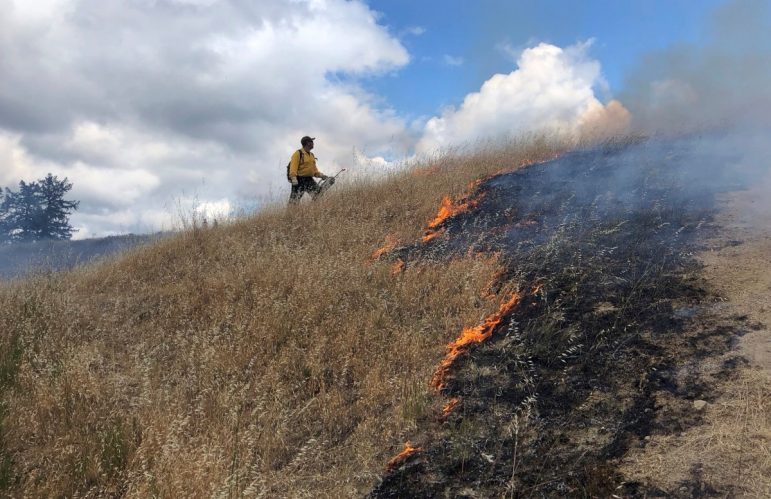
WHAT THE BILL WOULD DO
SB 224 would mandate mental health instruction in middle schools and high schools that have an existing health education course. Supporters hope that such instruction would eventually be required in all schools statewide. Content would cover a range of topics, including habits that promote mental wellness, signs and symptoms of common mental health conditions and ways to seek help.The bill is carried by Democratic Sens. Anthony Portantino of La Cañada Flintridge and Susan Rubio of Baldwin Park.
WHO SUPPORTS IT
A coalition of nearly 50 organizations that advocate for mental health, children’s rights, disability rights and civil rights, along with the California Hospital Association and the American Academy of Pediatrics, support the bill. They say it’s crucial to reduce stigma and normalize conversations about mental health in schools, since that’s where children and adolescents spend the majority of their time.
WHO’S OPPOSED
No current opposition. To address concerns raised by teachers unions, the bill’s scope was reduced to include only schools with current health education programs, as opposed to all schools in the state.
WHY IT MATTERS
Over the past decade, rates of hospitalization for mental health emergencies have been skyrocketing among children and adolescents. Between 2012 and 2019, California emergency rooms reported a 42% increase in the number of children they were treating for mental illness. The pandemic has further exacerbated the trend.
GOVERNOR’S CALL: ?
Greater access to police records

WHAT THE BILL WOULD DO
SB 16 by Berkeley Democratic Sen. Nancy Skinner would expand the public’s access to police records — allowing them to view sustained findings in which an officer used unreasonable force, failed to intervene when another officer used excessive force, engaged in racist or biased behavior, or conducted unlawful arrests and searches. It also would allow release of records after an officer resigns, put a 45-day limit on when agencies must respond to records requests, and remove the time limit on when judges can consider police misconduct complaints to be admissible in criminal cases.
WHO SUPPORTS IT
The American Civil Liberties Union, the California News Publishers Association, the California Public Defenders, the California Police Chiefs Association and a long list of civil rights organizations. Supporters see this bill as a way to hold more police accountable.
WHO’S OPPOSED?
Originally opponents included the League of California Cities, which argued that the bill would place a substantial burden on city budgets, and the California State Sheriffs’ Association, which contended the bill was too broad. Both dropped their opposition after the bill was amended to limit mandatory release of information only in sustained cases, not every incident.
WHY IT MATTERS
California is one of the most restrictive states in the nation when it comes to releasing police misconduct records. In 2018, the Legislature passed a law giving the public access to police records if officers lied during an investigation, sexually assaulted someone, or used their guns or other force in a case in which someone was seriously injured or died. This bill would further expand that access.
GOVERNOR’S CALL: ?
Vote-by-mail for farmworker union elections
By Grace Gedye

WHAT THE BILL WOULD DO
Currently, farmworker union elections are held in-person, often on the grower’s property. AB 616 by Democratic Assemblymember Mark Stone of Santa Cruz would give farmworkers the option to vote at home — or anywhere else they like — in union elections. Then they could deliver or send their ballot, sealed in a signed envelope, to the state board that oversees farmworker union elections, or they could give it to an organizer to deliver on their behalf.
WHO SUPPORTS IT
Labor groups and unions, including United Farm Workers, which sponsored the bill. They say it would make union elections more accessible to farmworkers.
WHO’S OPPOSED
Business groups, like California Chamber of Commerce, and groups that represent the interests of farm owners, like the Western Growers Association, oppose the bill. They say they’re concerned about workers being pressured into voting a certain way if this bill is enacted. Workers are allowed to have a witness present when they vote at home under this bill.
WHY IT MATTERS
The rate of unionization among farm workers is incredibly low — approximately 0% according to analysis from UC Merced. Unions are linked to higher wages and better benefits for workers. This bill would give farm workers another way to participate in union elections and could speed up the election process.
GOVERNOR’S CALL: ?
Removing condoms without consent

WHAT THE BILL WOULD DO
AB 453 would make it illegal to remove a condom without consent during sexual intercourse. This bill by Democratic Assemblymember Cristina Garcia of Downey would make it so that “stealthing” — nonconsensual condom removal — be considered sexual battery under the state’s Civil Code, allowing victims to sue their sexual partners for damages.
WHO SUPPORTS IT
Erotic Service Providers Legal Educational Research Project, a legal advocacy group that argues this piece of legislation is of particular importance for sex workers.
WHO’S OPPOSED
None known..
WHY IT MATTERS
A 2017 Yale University study that found nonconsensual condom removal is becoming “a common practice among young, sexually active people.” Victims have expressed fears of pregnancy and disease. This measure, if signed, would make California the first state in the country to outlaw stealthing.
GOVERNOR’S CALL: ?
Holding fashion brands liable for fair wages
By Nigel Duara

WHAT THE BILL WOULD DO
SB 62 would mandate paying garment workers by the hour unless they collectively bargain for a per-piece rate. Carried by LA Democratic Sen. Maria Elena Duraza, it also would introduce the concept of brand liability, extending liability for wage theft from the factories to the brands and retailers, as well as subcontractors in between.
WHO SUPPORTS IT
Labor unions and anti-poverty advocates say it’s needed to protect skilled garment workers from exploitation by banning per-piece rate. Co-sponsors, including the California Labor Federation, Garment Worker Center and Western Center on Law and Poverty, say underground operations are able to pay as little as 12 cents per piece, which amounts to wage theft.
WHO’S OPPOSED
The California Chamber of Commerce and other business groups object to the brand guarantor provision, which holds fashion brands and retailers liable for wage theft. Business interests argue that existing law is already strong enough; they just have to be enforced.
WHY IT MATTERS
This is both about the number of jobs available and the amount of pay for this type of work. While supporters say it’s meant to protect pay for a vulnerable workforce, the clothing industry warns it could move jobs offshore, reversing a recent trend to move jobs back to America during the pandemic. This is labor’s second attempt to change how workers are paid in the underground Los Angeles garment industry. A similar bill died last year in the waning hours of the legislative session.
GOVERNOR’S CALL: ?
Protecting protestors from rubber bullets
By Robert Lewis
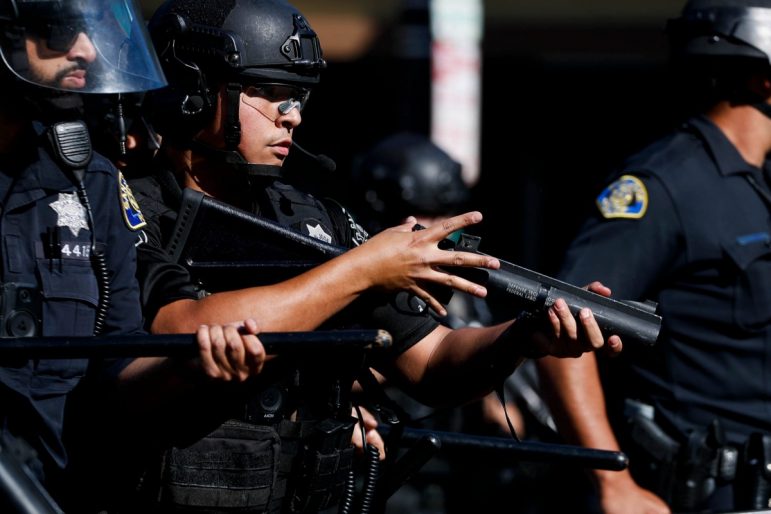
WHAT THE BILL WOULD DO
AB 48 would limit police use of rubber bullets and other less lethal weapons at protests and demonstrations to certain situations, such as when someone’s life is in danger or to bring a dangerous situation under control after other means don’t work. Departments would also need to release reports on their use of such weapons. Its authors include Democratic Assemblymembers Lorena Gonzalez, Cristina Garcia and Ash Kalra.
WHO SUPPORTS IT
The California Faculty Association, news groups, labor organizations and student associations like the University of California Student Association are among those touting the bill as a way to protect people exercising their constitutional right to assemble and protest.
WHO’S OPPOSED
The California State Sheriffs’ Association and some local law enforcement groups contend the bill would take away discretion from officers who should have the right to use less lethal weapons as they deem necessary.
WHY IT MATTERS
Police in California have resorted to using rubber bullets and tear gas against demonstrators and journalists — most recently during last summer’s protests in the wake of the police killing of George Floyd in Minneapolis. In some cases, people were seriously injured, leading to lawsuits contending the officers used such weapons inappropriately.
GOVERNOR’S CALL: ?
Cracking down on debt settlement firms
By Erika Paz

WHAT THE BILL WOULD DO
The federal government regulates debt settlement companies only if they service customers across state lines. AB 1405 by Democratic Assemblymember Buffy Wicks of Oakland would give California consumers greater protections, including a three-day cooling off period so they could review the newly required disclosures before committing to a debt settlement service.
WHO SUPPORTS IT
The bill is sponsored by the California Low-Income Consumer Coalition. Backers include the Consumer Justice Clinic at the East Bay Community Law Center, whose focus is on low-income consumers facing issues like debt collection and predatory lending, AARP California, the California Association of Collectors, OneMain Financial, and a number of legal aid clinics and consumer advocacy organizations.
WHO’S OPPOSED
The American Fair Credit Council and the Consumer Debt Relief Initiative, both representatives of debt settlement companies, dropped their opposition after a provision prohibiting referral fees — a main source of income for debt settlement companies — was removed from the bill. Thurman Legal objected late in the game, wanting exemptions for lawyers providing the same services.
WHY IT MATTERS
Consumers reach out to debt settlement companies when they are most vulnerable, not always fully understanding that it exposes them to legal action from their creditors. If this bill achieves its goal, it would help Californians better assess the risks and costs of debt settlement services.
GOVERNOR’S CALL: ?
Gender-neutral toy sections
By Grace Gedye

WHAT THE BILL WOULD DO
AB 1084 would require large department stores that sell kids’ products to maintain a gender-neutral section of toys and child care items. Stores that do not comply would face a light penalty: a fine of up to $250 for first offenses, and a fine of up to $500 for second offenses. It’s carried by Democratic Assemblymembers Evan Low of San Jose and Cristina Garcia of Bell Gardens.
WHO SUPPORTS IT
The Phluid Project, which partners with brands to distribute gender-free clothing and accessories, argues that the bill will increase freedom of expression for children and parents. It’s also backed by Equality California and the Consumer Federation of California, which says that products marketed to girls often have higher price tags.
WHO’S OPPOSED
Socially conservative groups including the Capitol Resource Institute and California Family Council say it’s not the state’s role to mandate how stores market their products. Retailers objected to an earlier version of the bill that included children’s clothing, a provision since removed from the bill.
WHY IT MATTERS
This bill might not radically alter Californians’ shopping experiences: Some large stores already organize their toys by type of product rather than by gender. But it’s a foot in the door for advocates who could push for bigger change in the future.
GOVERNOR’S CALL: ?
Truth in recycling
By Sameea Kamal

WHAT THE BILL WOULD DO
SB 343 restricts what kinds of plastic packaging can tout the triangular symbol known as “chasing arrows” under the state’s truth-in-advertising law. Under the bill, CalRecycle would get to decide what’s deemed “recyclable.”
WHO SUPPORTS IT
Environmentalist groups including California’s Sierra Club and the National Stewardship Action Council support the bill as one of several efforts to reduce plastic and waste.
WHO’S OPPOSED
The plastics industry says the bill could pile waste in landfills and raise packaging costs, especially for packaging that ships to different states with different laws. Based on industry concerns, the bill was amended to give packaging producers more time to update labeling.
WHY IT MATTERS
At least 85% of single-use plastics in California do not actually get recycled, and wind up in the landfill. Some argue that the bill would increase costs to Californians. Environmentalists argue that they’re already paying the price: Local garbage collection rates are escalating because non-recyclables and recyclables are mixed together in the blue bins, requiring more sifting and sorting at recycling plants.
GOVERNOR’S CALL: ?
Easing transfers to UC and Cal State
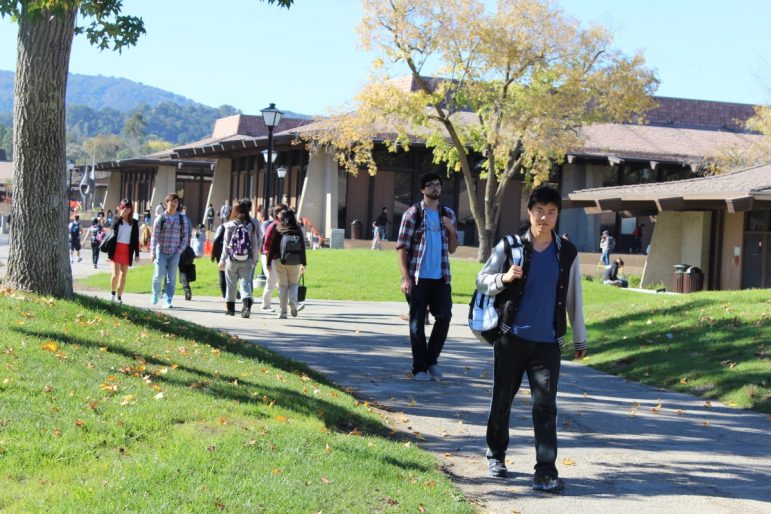
WHAT THE BILL WOULD DO
Assembly Bill 928 by Democrat Marc Berman of Los Altos means to make it easier for community college students to transfer to a California State University or University of California campus. It would:
- Have the UC and Cal State systems agree on a common set of general-education courses that community college students must take to get into either system
- Require that community colleges place all would-be transfer students — even if they want to attend UC or another college — into the existing “guaranteed transfer path” to get into a Cal State, unless they opt out.
WHO SUPPORTS IT
Lt. Gov. Eleni Kounalakis and a constellation of student advocacy groups, including the Campaign for College Opportunity, a research and advocacy organization. They view this bill as continuing the promise of a smoother transfer path for community college students. Cal State and the student associations of the Cal State and UC systems also back the bill. Some also point out that the two systems already have common course admissions requirements for high schoolers but not for transfer students.
WHO’S OPPOSED
A lot of heavy hitters: the UC Office of the President, the Chancellor’s Office of the California Community Colleges, the faculty association representing community colleges and the academic senates of the community college, the UC and Cal State systems. They say it has the right intentions but the wrong execution. Also opposed: Gov. Gavin Newsom’s finance department, which cites costs of at least $130 million. The student senate of the community college system is neutral.
WHY IT MATTERS
Most community college students want to transfer, but after three years, only about 22% do — even though those students are sold on an idea that they can spend two years in community college and then two more at a UC or Cal State to earn their bachelor’s. The transfer path is a maze, stalling the ambitions of tens of thousands of students. If this bill achieves its goal, students could take fewer classes and therefore charge the state less money in community college tuition waivers.
GOVERNOR’S CALL: ?
A free press at protests
By Robert Lewis
WHAT THE BILL WOULD DO
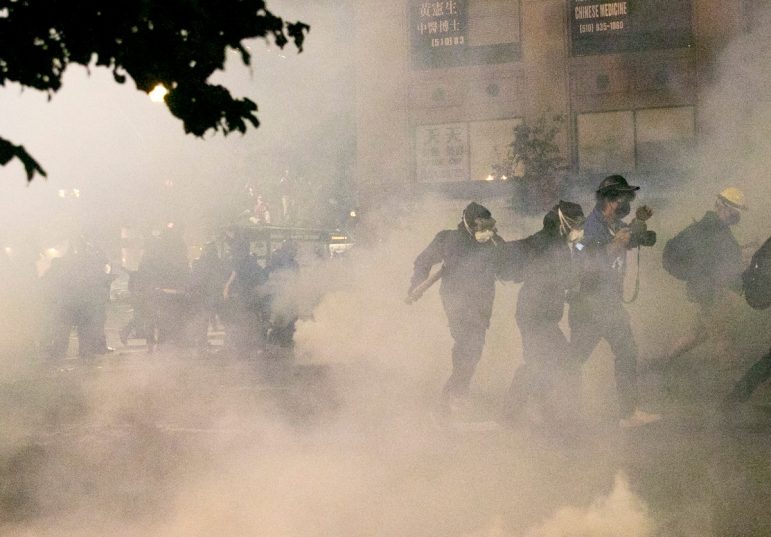
SB 98 would prevent police from blocking journalists covering protests and demonstrations. The bill, by Healdsburg Democratic Sen. Mike McGuire, would ensure reporters can be in protest areas without being arrested and prohibits police from “intentionally assaulting, interfering with, or obstructing” their newsgathering.
WHO SUPPORTS IT
The California News Publishers Association, American Civil Liberties Union and First Amendment Coalition say the legislation is necessary after recent high-profile incidents in which reporters were arrested and, in some cases, assaulted with less-lethal munitions while covering demonstrations.
WHO’S OPPOSED
The California Police Chiefs Association wants to be able to control where the media goes during events and worries that costly litigation may result if their officers violate the proposed statutes.
WHY IT MATTERS
Police have cracked down — sometimes violently — on protests and demonstrations in recent years, including instances in which journalists covering events were arrested and injured. Such tactics limit the ability of news organizations to bear witness, an important function in a democracy, and to provide oversight of officers whose use of force and crowd-control tactics have led to civilian injuries and lawsuits.
GOVERNOR’S CALL: ?
